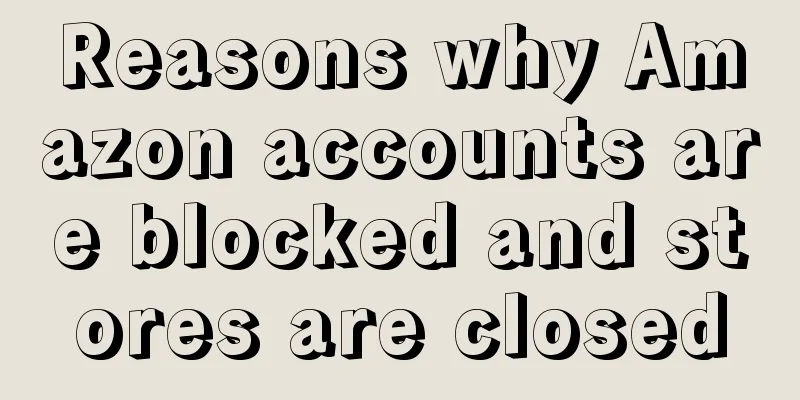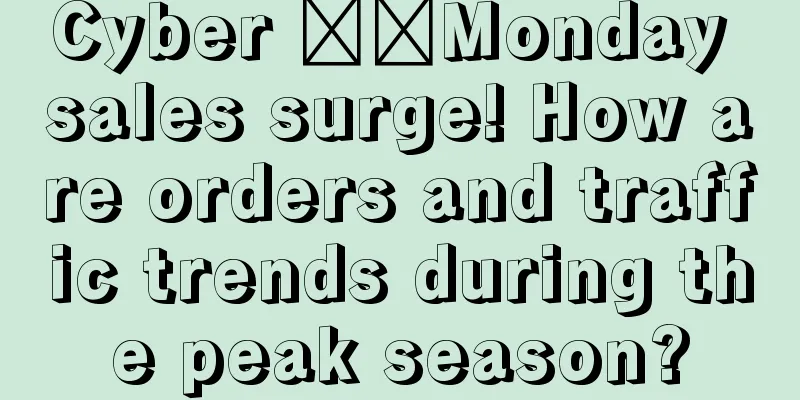Reasons why Amazon accounts are blocked and stores are closed

|
In order to protect the interests of sellers and create the ultimate customer shopping experience, Amazon has set "rules of the game". As a seller, only by understanding the factors that affect account security and taking effective measures can you avoid account restrictions. So what behaviors will lead to account restrictions and store closures? 1. Account Linking In order to ensure fair competition among sellers and improve the shopping experience of buyers, Amazon stipulates that the same identity is not allowed to have multiple accounts on the same site. "Association" means that Amazon obtains seller-related information through technical means, and determines that multiple store accounts belong to the same seller by matching association factors. Some sellers close their stores as soon as they open them, which is actually because of the association of the above information. Amazon will use factors such as phone number, email, payment account, address, product information, network IP, etc. to determine whether the account is associated. If a single factor is the same, the possibility of causing an association will be relatively small. However, if multiple factors are the same, the possibility of being detected by Amazon is very high, and the risk of the store being closed is higher. In particular, when one of the accounts has a problem (such as infringement), it will affect other accounts associated with it. Therefore, we should try to avoid or reduce the associated factors to reduce account risks. II. Infringement As we all know, European and American countries have very strict protection of intellectual property rights. Therefore, when doing business in foreign markets, in addition to protecting your own intellectual property rights, you must also ensure that you do not infringe on the intellectual property rights of others. The same is true on the Amazon platform. If a seller is complained of infringement, the seller will be removed from the shelves at the least, and the account will be directly blocked and the store will be closed at the worst. Infringement includes brand trademark infringement, patent infringement (appearance, invention, practical), copyright infringement, and stolen pictures. In the operation process, the easiest thing to do is to follow the seller. For most novices, following the seller is a good starting mode. Follow the seller to sell hot-selling products, intercept the traffic of big sellers, and quickly receive orders to open up the situation. Following the seller is a unique feature of the Amazon platform that distinguishes it from other platforms, that is, sellers do not need to create listings separately. Products can be sold by following other sellers' listings, but there are also many violations in following the seller. For example, the products that are followed are products that the seller cannot get the source of, and the products that are followed are the products of the brand owner. Following the seller without the consent of the brand is an infringement. 3. Selling counterfeit goods Regardless of the platform, the sale of counterfeit goods is prohibited, and the Amazon platform has stricter requirements. Amazon's anti-counterfeit policy is that any product sold on the Amazon website must be authentic, and the sale of unauthorized copies, pirated copies, and counterfeit goods is prohibited. If someone is complained about selling on the Amazon platform, the seller's account will easily be suspended by Amazon and the funds will be frozen. 4. Account Health Status Performance indicators are a code of conduct set for third-party sellers. Amazon uses performance indicators to distinguish between good, medium and poor sellers. If the performance is too poor, it will also lead to the closure of the store. For example, not responding to customers, too many negative feedback, too long delivery cycle, etc. Amazon requires sellers to provide high-quality products and services. If the account performance is poor and the order defect rate (ODR) exceeds the standard, the account will be reviewed or restricted. The assessment of the ODR indicator includes three aspects: A-to-Z claim disputes, negative store feedback, and credit card rejections. If the ODR exceeds 1%, it is considered too high. The order cancellation rate and delayed delivery rate lead to store closures, indicating that the seller has problems with product inventory and delivery processes. The order cancellation rate refers to the seller's active cancellation of the order, rather than the buyer's cancellation. The delayed delivery rate, Amazon platform stipulates that all orders must be shipped within 72 hours. If the seller fails to confirm the order as shipped and ship it in time within 72 hours after the customer places the order due to its own reasons, the changed order will be counted as delayed orders. If there are too many delayed orders in the account and the delayed delivery rate exceeds 4%, Amazon will receive a system warning. In serious cases, the sales privileges may be removed, resulting in account restrictions. 5. Tax issues (VAT) There are 9 countries where you can sell on Amazon. Sales tax is required in North America and Japan. The platform will directly deduct sales tax when the order is executed, and the tax rate is very low. The United Kingdom, Germany, France, Italy, and Spain are countries with very complete tax systems. Any citizen and individual must pay taxes legally and in compliance with regulations. Many Chinese sellers have a misunderstanding of tax issues and think that the 20% VAT levied by European countries should belong to their own profits. In fact, the sales unit price of all products sold on Amazon Europe is tax-inclusive, so VAT must be paid, otherwise Amazon will close the seller's account. Amazon will not be soft on this point, because no one is above the law. 6. KYC audit failed This happens more often to European accounts, and the full name is Know Your Customer, which is a European account qualification review. It is usually blocked because the seller cannot provide complete information. According to the requirements of relevant European regulatory agencies, Amazon is obliged to conduct company and company owner identity review (KYC review for short) for sellers who open stores on European platforms (including the United Kingdom, France, Germany, Spain, Italy, etc.). Sellers can only sell on European platforms after being reviewed and approved by the European verification team. For this reason, sellers are required to fill in the relevant information truthfully and upload the required documents as required through the seller backend when registering and after registration. If the KYC review fails, the store will also be blocked. 7. Fake orders and manipulated reviews Amazon officials have always hated fake orders and illegal reviews, and other manipulating reviews. Amazon's big data has been continuously upgraded, and it often carries out decapitation operations against fake orders. It has also begun to prepare for large-scale phishing enforcement, and the risk of fake orders will be greatly increased. 8. Violation of sales policy If a seller sells items that are prohibited by the platform, or sells them in a manner prohibited by the platform, his account may be reviewed.
|
Recommend
What is PinFollow? PinFollow Review
PinFollow is a Pinterest marketing tool that autom...
A large number of sellers fled to Pinduoduo across borders: Shopee retreated, Wish suffered huge losses!
▶ Video account attention cross-border navigation ...
Free influencer tool: Find the influencer that suits you through competitor listings
Cooperating with influencers is a common off-site ...
Costco's January sales increased by 15.5% to over $15.7 billion! E-commerce sales increased by 9% year-on-year!
It is learned that Costco announced sales of US$15...
Seller burst into tears! Encountered Amazon's "real reviewer" and lost thousands of dollars overnight!
On Amazon, there is a group of people who don’t se...
What is Parachute? Parachute Review
Parachute is an Internet home furnishing brand ded...
Amazon Vine has a major positive! Multiple product nodes are strictly inspected
In the past two days, Amazon announced new changes...
Musk plans to lay off 3,700 people at Twitter and will cancel remote work
It is learned that billionaire Musk plans to annou...
The Putian tycoon won the IPO and earned 4.8 billion in one year!
In the unpredictable year of 2024, the cross-borde...
What is Price Guarantee? Price Guarantee Review
Price Guarantee is a new project launched by eBay,...
Off-site traffic will be blocked? Amazon issued an important statement!
A piece of news suddenly appeared these two days,...
What is YouTube? YouTube Review
It is a video sharing website originated from the ...
What is FindMyfbid? FindMyfbid Review
FindMyfbid is a tool to find the ID of a FB accoun...
Deal development letter tutorial for beginners
When it comes to development letters, most people ...









